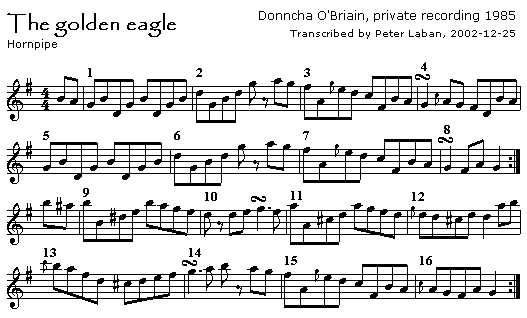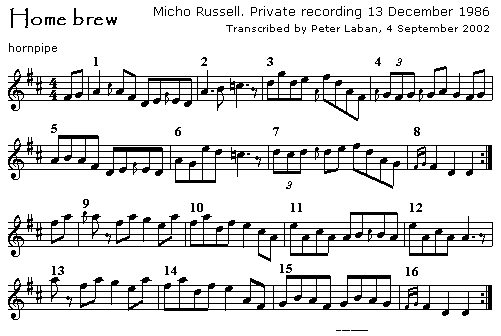Almost all these questions have now been answered with better answers than I can give, but I just have a couple things to add. The most important being that I should have just spoken for my own situation and not said things like "most of us", etc. I don't know who "most of us" are even

. So let me identify myself as a person who can read music, who is a total beginner in seriously listening to and wanting to play Irish music, who does have some background in playing classical music on the piano and American country music on the guitar, and who can sight read music at a very elementary level on the piano.
canpiper wrote:Cynth wrote:
Hold on a minute! There might be some real advanced players who can look at the sheet and play the tune in the correct style so that it sounds like music. But most of us can't. Some of us can pick up the skeleton of the tune from the sheet, but have to listen to it on CD's to hear how it should actually sound.
Is that true? That was really a part of my original question. My guess (and the sense I'm getting from the thread so far) is that this might be a little strong. I have no doubt that it is the rare whistle player (or musician of anykind) who can "sight read" in the sense clarified above by burnsbyrne and some others - who can look at a piece and play it flawlessly at a performance level without rehersal - but I've usually understood (perhaps, then, misunderstood) the ability to sightread as a matter of degree, such that it would be meaningful to ask how well one sight reads (as I did earlier). I expect that there are a lot of people, like myself, who are far from being 'really super advanced', but who can play most tunes smoothly and make them sound like music (and, more importantly, the music the notes are meant to represent) after a few run throughs to iron out difficult parts, and to figure out what kind of ornamentation to impose.
canpiper wrote:Cynth wrote:The sheet music doesn't help you with phrasing, ornamentation, etc. So the people that can sight read up to speed and sound good are really super advanced players.
Music can convey quite a lot, actually, so again, I'm not sure I completely agree, but I was independently interested about the ornamentaion point. It seems like a lot (if not most) written music for the whistle out there is sans ornamentation. Why? You can write grace notes in most music programs, can't you? I know Bagpipe music includes all of a tunes ornamentations. Why doesn't whistle music? Is it another convenience issue? It's completely understandable if it is, of course. Although, it does impede ones ability to translate the score to music - and may defeat it in some cases, as Cynth suggests.
Could it be that the music should be flexible, or that it is shared by numerous instruments, and so would be inappropriate to add instrument specific ornaments?
Thoughts?
I could find a sheet music tune for some American country or bluegrass tune and I would probably have an idea of how it should sound because I have listened to that kind of music so much. On any music, I could hit the notes, but I could only get the right "sound" on music that I had listened to alot. I might not have heard that particular tune, but I would have heard many like it and I would have in my head the style---I guess that would be phrasing, emphasis, ornamentation, etc.---and what you do to get that style. I'm speaking just for me. Since I haven't listened to enough Irish music with real care and my understanding of what the musician is actually doing to get the sounds that make the style is very limited, I can play the notes of an Irish tune as written and it will sound absolutely nothing like music, let alone Irish music, because I don't understand how to make it sound like Irish music---the phrasing, ornamentation (the least of the problems), subtle timing changes, emphasis, variations, etc. But I am a beginner, so "most of us" was a goofy thing to say. But from where I am, it would be a very advanced player who could look at a sheet and have in his head what to do with the notes to make that tune sound like Irish music. Even someone who could do that with a lot of run throughs would be very advanced in my book!
Screeeech!!! wrote:Cynth wrote:So the people that can sight read up to speed and sound good are really super advanced players. I'm talking about Irish trad music here.
I don't understand why you have to make this genre specific? I can't for one moment see that sight reading ITM is any different to sight reading any other genre.
I think this is a good point. I was thinking of classical music where you usually do have phrasing, staccato markings, rests, speed changes, ornamentation, etc. a lot of things marked in to help you sort of understand where the music is going. In the Irish sheet music I've seen, there is nothing to guide you along. But I think there is really just as much in classical music that can't be written down as in any other kind of music. The markings give hints, but you can make a real hash of it anyway.
I think notation is one way we preserve and pass along music and then good musicians, people who have been trained or who have studied or grown up within a musical tradition, can interpret the notation to make the sort of music the notes were intended to make.
canpiper wrote:While trad music is far less technically demanding then many other forms,
I don't agree with this, but again, my experience is limited. When I listen to a master of any instrument in Irish (or in other traditional music I have listened to), that person seems as far away from me in technical ability as, say, Dinu Lipatti does on the piano. And I'm talking just about physical dealings with the instrument.
Diligentia maximum etiam mediocris ingeni subsidium. ~ Diligence is a very great help even to a mediocre intelligence.----Seneca

